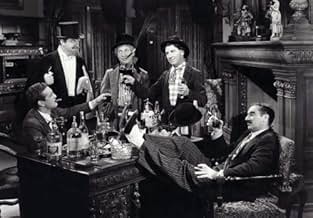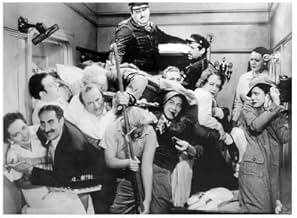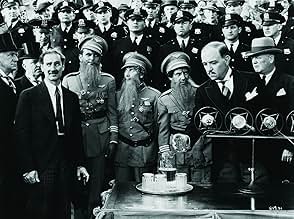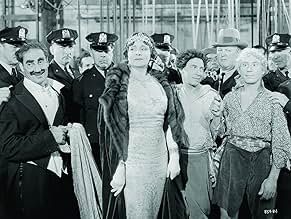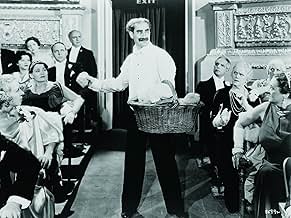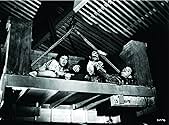VALUTAZIONE IMDb
7,8/10
35.806
LA TUA VALUTAZIONE
Un astuto direttore commerciale e due stravaganti amici di due cantanti d'opera li aiutano a raggiungere il successo mentre umiliano i loro nemici.Un astuto direttore commerciale e due stravaganti amici di due cantanti d'opera li aiutano a raggiungere il successo mentre umiliano i loro nemici.Un astuto direttore commerciale e due stravaganti amici di due cantanti d'opera li aiutano a raggiungere il successo mentre umiliano i loro nemici.
- Regia
- Sceneggiatura
- Star
- Premi
- 3 vittorie totali
Walter Woolf King
- Rudolfo Lassparri
- (as Walter King)
Sig Ruman
- Herman Gottlieb
- (as Siegfried Rumann)
Robert Emmett O'Connor
- Police Sergeant Henderson
- (as Robert Emmet O'Connor)
Enrique Acosta
- Nightclub Guest
- (non citato nei titoli originali)
Harry Adams
- Opera Spectator
- (non citato nei titoli originali)
Harry Allen
- Doorman
- (non citato nei titoli originali)
Sam Appel
- Dungeon Guard
- (non citato nei titoli originali)
King Baggot
- Dignitary
- (non citato nei titoli originali)
Marion Bell
- Lady looking for 'Aunt Minnie'
- (non citato nei titoli originali)
Edna Bennett
- Maid
- (non citato nei titoli originali)
Dolly Blackburn
- Little Girl watching Harpo playing
- (non citato nei titoli originali)
Riepilogo
Reviewers say 'A Night at the Opera' is celebrated for its iconic comedic routines and the Marx Brothers' unique blend of verbal and physical comedy. Groucho's wit, Chico's musical talents, and Harpo's slapstick humor are highlighted. Margaret Dumont's role and musical numbers add entertainment value, though some criticize their integration. The film is praised for its production quality and subversion of high society norms. However, a perceived shift towards more structured comedy marks the beginning of a decline in their later works.
Recensioni in evidenza
I must admit that I am very light in personal knowledge of MArx Brothers films,and aside from the general information,imagery and quotes(the majority of which came from the irrepressible Groucho)that have been used and attributed in Western culture over the last seventy or eighty odd years,I have a very scant referential knowledge of their legendary body of film work.
With that in mind,when I saw the public library had a copy of this film in its stacks,it was a no-brainer for me. And it was a largely pleasing film experience as well.
The storyline seems to be somewhat insignificant: Brothers MArx are scattered about the goings on at a Venetian Opera company as it moves from Europe to New York City. They conspire to break a humble but talented tenor into the main role of the traveling show,as he is mooning over the young ingénue(Kitty Carlisle Hart,WELL before becoming the grand dame of TV Panel game shows!). But aside from the fair amount of music(hey,this IS,after all set in an Opera,so it goes to reason),this is mostly a physical comedy,laced with plenty of Groucho's standard one-liners. From watching his dealings with various straight people,from old stand-by MArgaret Dumont as his society-climbing wife,to the various lugs who signify authority(Theater directors,producers,society bigwigs,ship crew,policemen,local magistrates,etc.),Groucho is not only able to keep the humor legendarily fast and loose but also keeps the tempo of the dialog from bogging(I even noticed a sort of inspiration the creators at WArner Brothers got for Bugs Bunny from Groucho's witticisms!).
Maybe not the best of the Marxes films--though I still don't have a real gauge of opinion on this yet--but it's a fantastic starter film to build familiarity.
With that in mind,when I saw the public library had a copy of this film in its stacks,it was a no-brainer for me. And it was a largely pleasing film experience as well.
The storyline seems to be somewhat insignificant: Brothers MArx are scattered about the goings on at a Venetian Opera company as it moves from Europe to New York City. They conspire to break a humble but talented tenor into the main role of the traveling show,as he is mooning over the young ingénue(Kitty Carlisle Hart,WELL before becoming the grand dame of TV Panel game shows!). But aside from the fair amount of music(hey,this IS,after all set in an Opera,so it goes to reason),this is mostly a physical comedy,laced with plenty of Groucho's standard one-liners. From watching his dealings with various straight people,from old stand-by MArgaret Dumont as his society-climbing wife,to the various lugs who signify authority(Theater directors,producers,society bigwigs,ship crew,policemen,local magistrates,etc.),Groucho is not only able to keep the humor legendarily fast and loose but also keeps the tempo of the dialog from bogging(I even noticed a sort of inspiration the creators at WArner Brothers got for Bugs Bunny from Groucho's witticisms!).
Maybe not the best of the Marxes films--though I still don't have a real gauge of opinion on this yet--but it's a fantastic starter film to build familiarity.
Groucho Marx is in his element as slick, fast talking business manager Otis B. Driftwood, who spends his time playing up to arts patron Mrs. Claypool (classic Marx Bros. foil Margaret Dumont). When he sees that she's willing to pony up $1,000 a night to have pompous Lassparri (Walter Woolf King) sing, he wants a piece of the action. Circumstance soon throws him together with equally sly Fiorello (Chico) and goofy Tomasso (Harpo), as they become determined to help out young lovers & aspiring opera stars Rosa (Kitty Carlisle) and Ricardo (Allan Jones).
Even if one is not a fan of the opera, they shouldn't let that dissuade them from checking out the Marx Bros. in their glory. Some buffs consider this their best film, and it certainly shows off their talents to memorable effect. Musical interludes do go on a bit long, but the quality of the comedy when it occurs is top notch. There are some truly great bits in here, like the "party of the first part" contract, the overcrowded (to say the least) stateroom sequence, and the frantic, farcical efforts of Otis, Fiorello, Tomasso, and Ricardo to pull the wool over the eyes of a suspicious inspector (Robert Emmett O'Connor) by moving beds from one room to another.
Groucho is hilarious, as always. Very few entertainers in film history can fire off a one-liner as snappily as he does. Chico and Harpo have their wonderful moments, as well. (It's such a hoot when Harpo does a Spider-Man routine near the end.) Carlisle and Jones are extremely appealing, Dumont is once again a fine "straight woman", King is an appropriately snooty villain, Sig Ruman is superb as eternally frustrated Gottlieb, and O'Connor is likewise good as the antics of Otis and company take a toll on him.
The pace isn't always consistent, but there is some enjoyable action and first rate stunt work. Overall, this is a solid comedy / musical that will appeal to any lover of this era in cinema.
Eight out of 10.
Even if one is not a fan of the opera, they shouldn't let that dissuade them from checking out the Marx Bros. in their glory. Some buffs consider this their best film, and it certainly shows off their talents to memorable effect. Musical interludes do go on a bit long, but the quality of the comedy when it occurs is top notch. There are some truly great bits in here, like the "party of the first part" contract, the overcrowded (to say the least) stateroom sequence, and the frantic, farcical efforts of Otis, Fiorello, Tomasso, and Ricardo to pull the wool over the eyes of a suspicious inspector (Robert Emmett O'Connor) by moving beds from one room to another.
Groucho is hilarious, as always. Very few entertainers in film history can fire off a one-liner as snappily as he does. Chico and Harpo have their wonderful moments, as well. (It's such a hoot when Harpo does a Spider-Man routine near the end.) Carlisle and Jones are extremely appealing, Dumont is once again a fine "straight woman", King is an appropriately snooty villain, Sig Ruman is superb as eternally frustrated Gottlieb, and O'Connor is likewise good as the antics of Otis and company take a toll on him.
The pace isn't always consistent, but there is some enjoyable action and first rate stunt work. Overall, this is a solid comedy / musical that will appeal to any lover of this era in cinema.
Eight out of 10.
Amusing and entertaining Marx picture , it has a lot of funny material and unfortunately intrusive songs . Groucho's wisecracks and the incomparable Chico and Harpo carry the movie . It deals with a sly business manager named Otis B. Driftwood (Groucho Marx) and two (Chico Marx as Fiorello and Harpo Marx as Tomasso) wacky friends of two (Kitty Carlisle as Rosa and Allan Jones as Ricardo) opera singers help them achieve success while humiliating their stuffy and snobbish enemies . Later on , Marx Brothers anarchize the opera , insulting and mocking the guests and players . Their actions include some on stage antics during the stage debut , as they arrange for the normal tenor to be absent so that the young lover named Ricardo can get his chance .
Classic Marx film with many funny sequences , this is the most sustained bit of insanity , full of crazy gags , antics and amusement , being now deemed a satiric masterpiece ,and one of the biggest hits . Although it suffers from staginess and musical comedy plotting but gives the zany threesome plenty of comic elaboration . Enough gags for give several movies , but our favorite is still the cabin scene . Despite the abundant songs and silly as well as sappy love story the movie maintains itself very well . This is a fun comedy as hilariously amusing as the films they made at Paramount with Zeppo . This is a M.G.M production lavishly financed by Irving Thalberg . Excellent Harpo Marx , as usual , he even did many of his own stunts , he later said it was a silly thing for a 47-year-old non-stuntman to have done . Groucho said that this was his favorite among his movies . The Marx Bros (minus Zeppo) are in peak form in this vintage musical comedy with co-star the legendary Margaret Dumont , including sparkling dialogs with Groucho . Furthermore , Sig Ruman makes his first of three appearances in The Marx Brothers films. However , this is the first Marx Brothers film made without brother Zeppo Marx, it started a new trend of The Marx Brothers movies featuring a Zeppo-like supporting character who carries the love story and sings the song . The motion picture was well directed by Sam Wood . Sam Wood, freshman The Marx Brothers director in this film, was a perfectionist , the scene in which Harpo Marx hangs from the rope was filmed so many times that Harpo Marx's hands became cut and swollen from the rope . Don't miss it , one of the funniest picture ever made by Marx Brothers
Other important films starred by Marx Brothers -many of them Broadway farce plays transfered by scenarists into vehicle for the Brothres- , they are the followings : ¨Animal crackers¨, ¨Duck soap¨ that was a flop when first released but today considered a masterpiece , ¨Horse Feathers¨, ¨At the circus¨, ¨Day at the races¨ , ¨Room service¨ , ¨Go West¨, ¨Love Happy¨ and ¨Night in Casablanca¨, though in 1946 the Marx formula was wearing thin . Any film with Groucho , Chico , Harpo and Zeppo is well worth seeing .
Classic Marx film with many funny sequences , this is the most sustained bit of insanity , full of crazy gags , antics and amusement , being now deemed a satiric masterpiece ,and one of the biggest hits . Although it suffers from staginess and musical comedy plotting but gives the zany threesome plenty of comic elaboration . Enough gags for give several movies , but our favorite is still the cabin scene . Despite the abundant songs and silly as well as sappy love story the movie maintains itself very well . This is a fun comedy as hilariously amusing as the films they made at Paramount with Zeppo . This is a M.G.M production lavishly financed by Irving Thalberg . Excellent Harpo Marx , as usual , he even did many of his own stunts , he later said it was a silly thing for a 47-year-old non-stuntman to have done . Groucho said that this was his favorite among his movies . The Marx Bros (minus Zeppo) are in peak form in this vintage musical comedy with co-star the legendary Margaret Dumont , including sparkling dialogs with Groucho . Furthermore , Sig Ruman makes his first of three appearances in The Marx Brothers films. However , this is the first Marx Brothers film made without brother Zeppo Marx, it started a new trend of The Marx Brothers movies featuring a Zeppo-like supporting character who carries the love story and sings the song . The motion picture was well directed by Sam Wood . Sam Wood, freshman The Marx Brothers director in this film, was a perfectionist , the scene in which Harpo Marx hangs from the rope was filmed so many times that Harpo Marx's hands became cut and swollen from the rope . Don't miss it , one of the funniest picture ever made by Marx Brothers
Other important films starred by Marx Brothers -many of them Broadway farce plays transfered by scenarists into vehicle for the Brothres- , they are the followings : ¨Animal crackers¨, ¨Duck soap¨ that was a flop when first released but today considered a masterpiece , ¨Horse Feathers¨, ¨At the circus¨, ¨Day at the races¨ , ¨Room service¨ , ¨Go West¨, ¨Love Happy¨ and ¨Night in Casablanca¨, though in 1946 the Marx formula was wearing thin . Any film with Groucho , Chico , Harpo and Zeppo is well worth seeing .
"A Night at the Opera" is one of those films you can see dozens of times and laugh just as hard as you did the first time. The brothers get mixed up with an opera company and a divo and diva in love - Allan Jones and Kitty Carlisle, and trying to get the two to perform together.
The one-liners come so fast - you keep thinking you'll remember them, but one is funnier than the next. I do remember what Groucho says when he sees the gypsy Azucena in the opera, however. "How would you like to feel how she looks?" The stateroom scene is, of course, a classic, and my favorite part is when Groucho tells the housekeeper, "I want two pillows on that bed" and Harpo sound asleep and being moved everywhere, including onto a tray of food.
But nothing beats the last half hour - the performance of "Il Trovatore" with Harpo using the stage ropes like Tarzan, and Chico playing baseball in the orchestra while Groucho sells peanuts. They have replaced part of the overture with "Take Me Out to the Ball Game."
Allan Jones plays the tenor Ricardo Baroni who is hoping for his break. Why they cast the blond Jones as a tenor named Baroni - well, there you go. He sings very well and is quite handsome. Kitty Carlisle is the diva waiting, petite and pretty and singing music out of her vocal type, with the exception of "Alone." "Stridono lassu" and Leonora in Trovatore were both much too heavy for her. She does sing well and what a woman - she's still alive and recently performed at a New York supper club recently at the age of 95.
The only problem with any Marx Brothers film is that when they aren't in front of the camera, suddenly their films become very slow. Because I was trained in opera and have some interest in it, this was less the case than with some of their other films. They were too magical, too energetic, and too darn funny to ever share a spotlight with anyone else. Thank goodness they did, though, as they left us with many treasures. This is one.
The one-liners come so fast - you keep thinking you'll remember them, but one is funnier than the next. I do remember what Groucho says when he sees the gypsy Azucena in the opera, however. "How would you like to feel how she looks?" The stateroom scene is, of course, a classic, and my favorite part is when Groucho tells the housekeeper, "I want two pillows on that bed" and Harpo sound asleep and being moved everywhere, including onto a tray of food.
But nothing beats the last half hour - the performance of "Il Trovatore" with Harpo using the stage ropes like Tarzan, and Chico playing baseball in the orchestra while Groucho sells peanuts. They have replaced part of the overture with "Take Me Out to the Ball Game."
Allan Jones plays the tenor Ricardo Baroni who is hoping for his break. Why they cast the blond Jones as a tenor named Baroni - well, there you go. He sings very well and is quite handsome. Kitty Carlisle is the diva waiting, petite and pretty and singing music out of her vocal type, with the exception of "Alone." "Stridono lassu" and Leonora in Trovatore were both much too heavy for her. She does sing well and what a woman - she's still alive and recently performed at a New York supper club recently at the age of 95.
The only problem with any Marx Brothers film is that when they aren't in front of the camera, suddenly their films become very slow. Because I was trained in opera and have some interest in it, this was less the case than with some of their other films. They were too magical, too energetic, and too darn funny to ever share a spotlight with anyone else. Thank goodness they did, though, as they left us with many treasures. This is one.
"A Night at the Opera" is great Marx Brothers entertainment. It has comedy, music, and a good cast - everything except Zeppo, who by this time had left the act. It fully deserves its reputation as one of the two best Marx Brothers films, along with "Duck Soup".
"A Night at the Opera" is probably slightly less funny than "Duck Soup" (it is no criticism to say that of any film), but it has more of a story to connect the great comic bits. There is a good supporting cast in both films - here Sig Ruman is especially funny, in addition to the perennial Margaret Dumont. It also has several fairly long musical interludes - some are operatic, but the most entertaining is Chico and Harpo's impromptu shipboard entertainment.
Of course, the real attraction in any of these films is the comedy, and there are some memorable bits in this one. The contract negotiations between Chico and Groucho, and the scene in Groucho's stateroom, are especially hilarious, and you have to see the stateroom scene more than once to catch everything. And for sustained zany humor, the climactic sequence at the opera might be the funniest part of all.
This is certainly a must for Marx Brothers fans.
"A Night at the Opera" is probably slightly less funny than "Duck Soup" (it is no criticism to say that of any film), but it has more of a story to connect the great comic bits. There is a good supporting cast in both films - here Sig Ruman is especially funny, in addition to the perennial Margaret Dumont. It also has several fairly long musical interludes - some are operatic, but the most entertaining is Chico and Harpo's impromptu shipboard entertainment.
Of course, the real attraction in any of these films is the comedy, and there are some memorable bits in this one. The contract negotiations between Chico and Groucho, and the scene in Groucho's stateroom, are especially hilarious, and you have to see the stateroom scene more than once to catch everything. And for sustained zany humor, the climactic sequence at the opera might be the funniest part of all.
This is certainly a must for Marx Brothers fans.
Lo sapevi?
- QuizIn exasperation after several attempts to have Groucho Marx read one of his lines in the manner director Sam Wood had requested, Wood exclaimed, "I guess you just can't make an actor out of clay." Groucho Marx instantly responded, "Nor a director out of Wood."
- BlooperRicardo is clearly standing on the dock as the ship pulls away, yet he turns up on board later as a stowaway.
- Citazioni
Otis B. Driftwood: It's all right, that's in every contract. That's what they call a sanity clause.
[Fiorello laughs loudly]
Fiorello: You can't fool me! There ain't no Sanity Claus!
- Versioni alternativeAll references to the first portion of the film taking place in Italy were edited from the original negative sometime after the original release. There is speculation that this was done during WWII when Italy was as Axis power, but it also may have been done in the late 1930's to appease Mussolini, who didn't like the way Italians were being portrayed. Either way, the film's first scene begins rather abruptly and is missing a musical number and references to Milan, Italy.
- ConnessioniEdited into Apaga y vámonos: Episodio #1.5 (2013)
- Colonne sonoreIl Trovatore: Di quella pira
(1853) (uncredited)
Music by Giuseppe Verdi
Libretto by Leone Emanuele Bardare and Salvatore Cammarano
Sung by Walter Woolf King
with The MGM Symphony Orchestra
I più visti
Accedi per valutare e creare un elenco di titoli salvati per ottenere consigli personalizzati
Dettagli
Botteghino
- Lordo in tutto il mondo
- 8953 USD
- Tempo di esecuzione1 ora 36 minuti
- Colore
- Proporzioni
- 1.37 : 1
Contribuisci a questa pagina
Suggerisci una modifica o aggiungi i contenuti mancanti



